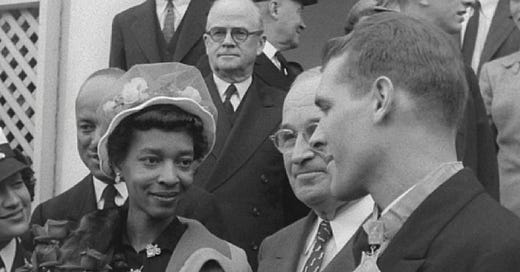On this day in 1950, Lt. (J.G.) Thomas Hudner crash lands in Korea. He was trying to save the life of Ensign Jesse Brown, the first black aviator in the U.S. Navy.
Not that Tom thought of Jesse that way. When Tom looked at Jesse, he didn’t see “the first black aviator.” He simply saw a friend. And he couldn’t leave his friend to die.
The Korean War was then waging, and Tom and Jesse were both assigned to USS Leyte. Their job was to provide air support for U.S. Marines on the ground. Unfortunately, things took a bad turn on December 4, 1950.
Jesse’s plane had taken a mortal hit. He had to land somewhere—and fast. Tom stayed on Jesse’s wing the whole way down, helping him through check lists. Then he watched his friend’s crash landing with dread, searching for signs of life.
What a relief when he saw Jesse waving from the wreckage! And what confusion when Jesse didn’t get out of the plane. What was wrong? Wisps of smoke began to waft from the plane, providing even more cause for worry.
“When I realized that Jesse’s airplane may burst into flame before [a helicopter] could get there,” Tom later said, “I made a decision to make a wheels-up landing, crash close enough to his airplane and pull him out of the cockpit and wait for the helicopter to come.”
Think about that. Tom had just witnessed a crash landing in terrible conditions. The weather was unbelievably cold, hovering around 0 degrees. Tom had been afraid that Jesse wouldn’t survive—but now he was determined to replicate the same nearly impossible feat.
“The ground seemed to rush at me as I hit,” Tom later reported, “and then I was out of control, snowplowing across the field and hoping I was going to end up somewhere close to Jesse.”
He’d done it. His back hurt so much that he thought he’d broken something, but he got out of his mangled plane, working through deep snow to find his friend.
The situation was serious. Jesse was alive, but his knee was trapped. Flames were sputtering, threatening to engulf the plane. Tom shoved snow on the fire to contain it. He pulled and pulled on Jesse, but to no avail. He wrapped Jesse’s hands and feet to ward off freezing temperatures. Both men waited, together, for a rescue helicopter.
Jesse was calm and composed. “When we were on the ground, he was calming me down,” Tom later told Daisy, Jesse’s widow, “when I should have been the one calming him down.”
Jesse seemed to be slipping in and out of consciousness. Finally, he revived enough to say: “Just tell Daisy how much I love her.”
After 40 long minutes, the helicopter finally arrived. Tom got an ax and swung it at Jesse’s plane repeatedly, but to no avail. Night was falling. The helicopter pilot gave Tom a choice: stay or go?
Tom still wavered. It was suicide to stay overnight in those freezing temperatures. He was prepared to stay if Jesse were alive, but Jesse had been unresponsive for a while.
“I made the decision to go with Charlie,” Tom later said. “I told Jesse we were going back to get equipment . . . I don’t know if he heard me. I don’t know if he was alive at the time.”
Tom felt sure that he would be court-martialed. He wasn’t supposed to crash land, even to save a fellow pilot. What a surprise when he was recommended for the Medal of Honor instead?
“There has been no finer act of unselfish heroism in military history,” the captain of Tom’s aircraft carrier would say.
Captain Thomas Hudner passed away several years ago, at the age of 93. RIP, sir.
Sources can always be found on my website, here.





This one deeply touched my heart! Captain Hudner did what most would not be willing to do even for a friend. In trying to save Jesse he did the unthinkable and crashed his own plane putting himself in terrible jeopardy. Doing this heroic act he thought he’d be courtmartialed. How fortunate the right thing was done and he was given a Medal of Honor instead. It would have been a great comfort to Jesse’s wife to know her husband had not been alone in his final moments and that his steadfast friend brought back such a special message.
What an admirable love for a friend! He more than deserved the MOH.